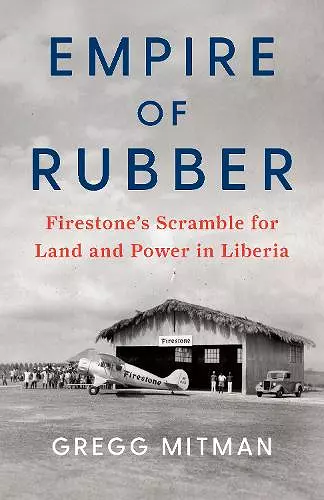Empire of Rubber
Firestone's Scramble for Land and Power in Liberia
Format:Hardback
Publisher:The New Press
Published:16th Dec '21
Should be back in stock very soon

An ambitious and shocking exposé of America’s hidden empire in Liberia, run by the storied Firestone corporation, and its long shadow
In the early 1920s, Americans owned 80 percent of the world’s automobiles and consumed 75 percent of the world’s rubber. But only one percent of the world’s rubber grew under the U.S. flag, creating a bottleneck that hampered the nation’s explosive economic expansion. To solve its conundrum, the Firestone Tire and Rubber Company turned to a tiny West African nation, Liberia, founded in 1847 as a free Black republic.
Empire of Rubber tells a sweeping story of capitalism, racial exploitation, and environmental devastation, as Firestone transformed Liberia into America’s rubber empire.
Historian and filmmaker Gregg Mitman scoured remote archives to unearth a history of promises unfulfilled for the vast numbers of Liberians who toiled on rubber plantations built on taken land. Mitman reveals a history of racial segregation and medical experimentation that reflected Jim Crow America—on African soil. As Firestone reaped fortunes, wealth and power concentrated in the hands of a few elites, fostering widespread inequalities that fed unrest, rebellions and, eventually, civil war.
A riveting narrative of ecology and disease, of commerce and science, and of racial politics and political maneuvering, Empire of Rubber uncovers the hidden story of a corporate empire whose tentacles reach into the present.
Praise for Empire of Rubber:
Named One of the Best Books of the Fall by Bloomberg
“Mitman peppers this history with a wealth of fascinating details and interesting characters.”
—Foreign Affairs
“A fascinating and enlightening page-turner that uncovers Liberia’s often-overlooked importance in U.S. history.”
—Foreign Policy
“Calls into question Western ideas of progress, and powerfully traces the results of the Firestone experiment to the war and poverty that would wrack the nation.”
—Shelf Awareness
“Superbly crafted. . . . Empire of Rubber is primarily a portrait of power as it was and is exercised through American capital.”
—Africa Is a Country
“Gregg Mitman provides an accessible, compelling, and monumental account of the surprisingly American history of Liberia.”
—Science for the People
"A well-rendered and -documented tale of exploitation in the developing world."
—Kirkus Reviews
"[Empire of Rubber] documents the fragile arrangement between Firestone and the Liberian government that has existed for 95 years, surviving civil war and power plays on both sides, proving lucrative for some while causing great devastation with its racism and the depletion of natural resources.”
—Booklist
“A harrowing and richly detailed account of U.S. tire manufacturer Firestone’s exploitation of Liberian workers in the 20th century . . . Mitman marshals a wealth of material to make his case, which encompasses ecological injustice, racial capitalism, and medical racism. The result is a devastating exposé of the tensions between ‘the interests of white capital and the desire for Black self-determination.’”
—Publishers Weekly (starred review)
“With the Firestone archives closed to him, Gregg Mitman has to strain for a clear view of how Harvey Firestone transformed a small Liberian rubber plantation into a Goliath that broke a British monopoly on latex. But Mitman’s lack of access to company archives makes Empire of Rubber a better book. He finds plenty of Liberians and Americans, or the archives and accounts left by their predecessors and by dissident scholars, to fill in the blanks. The reader is left with a gem of a social history linking two countries stuck in uncomfortable embrace for well over a century.”
—Paul Farmer, Kolokotrones University Professor and chair of Global Health and Social Medicine at Harvard University, and author of Fevers, Feuds, and Diamonds: Ebola and the Ravages of History
“Empire of Rubber is at once an iconic story and utterly unique. In Mitman’s clear, complex, and compelling narrative, he provides privy to the measured and malevolent workings of the U.S. as an imperial formation. Mitman’s account . . . is told with erudition and grace in a powerful narrative that combines the political imaginaries and grounded conditions of racism, capitalism, and visionaries long at the heart of imperial democracies.”
—Ann Laura Stoler, Willy Brandt Distinguished University Professor of Anthropology and Historical Studies and director, Institute for Critical Social Inquiry, New School for Social Research, and author of Duress: Imperial Durabilities in Our Times
“Gregg Mitman has delivered a brilliant, compelling read. Empire of Rubber draws together the long history of commodity colonialism, the imperial roots of Liberia’s recent civil war, and the fraught relations between American medical institutions and racism at home and abroad. Empire of Rubber dramatizes intersectional thinking at its very best.”
—Rob Nixon, Barron Family Professor of Environment and Humanities, Princeton University, and author of Slow Violence and the Environmentalism of the Poor
“In this brilliantly rendered, epic tale of American racial capitalism in West Africa, Gregg Mitman details the profound and devastating effects of plantation agriculture. In the process he unearths the political and legal machinations of Firestone rubber in undermining Black sovereignty, and reveals the violence of corporate philanthropy in the guise of development.”
—Julie Livingston, professor of history, and social and cultural analysis at New York University, MacArthur fellow, and author of Improvising Medicine
“In this brilliant and powerfully moving narrative of the Firestone Tire Company’s activities in Liberia, Gregg Mitman provides an unprecedented account of the destructive power of racial capitalism on colonized bodies and ecologies . . . Empire of Rubber is unique in its exposition of the connection between the Firestone company and elite American universities and unrivaled in its account of the valiant fight Liberians put up to maintain their autonomy.”
—Simon Gikandi, Robert Schirmer Professor of English, Princeton University, and author of Slavery and the Culture of Taste
ISBN: 9781620973776
Dimensions: unknown
Weight: unknown
288 pages